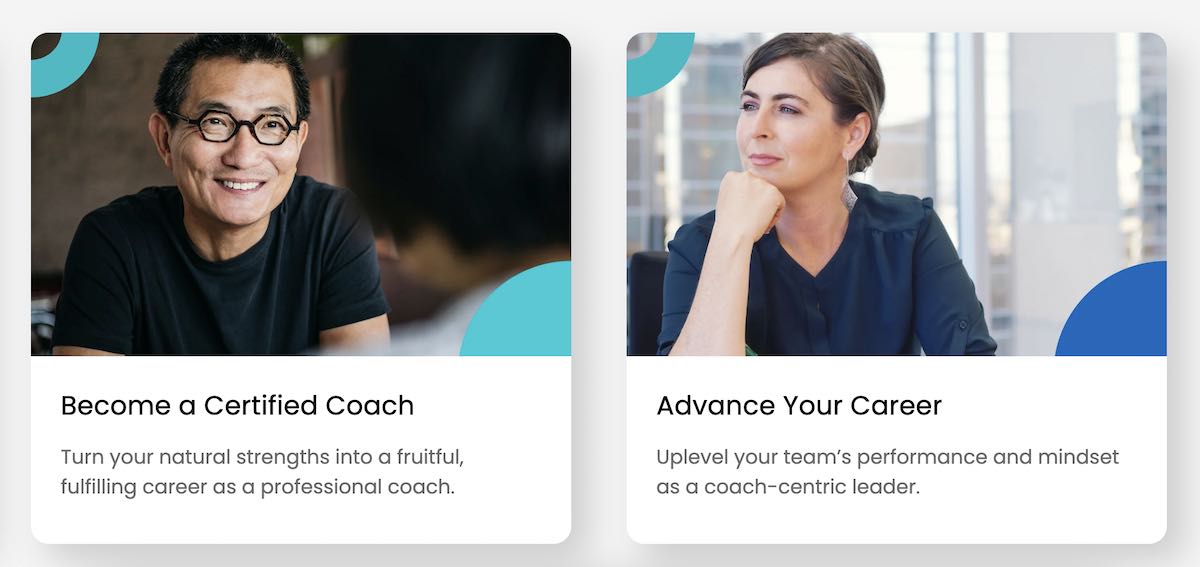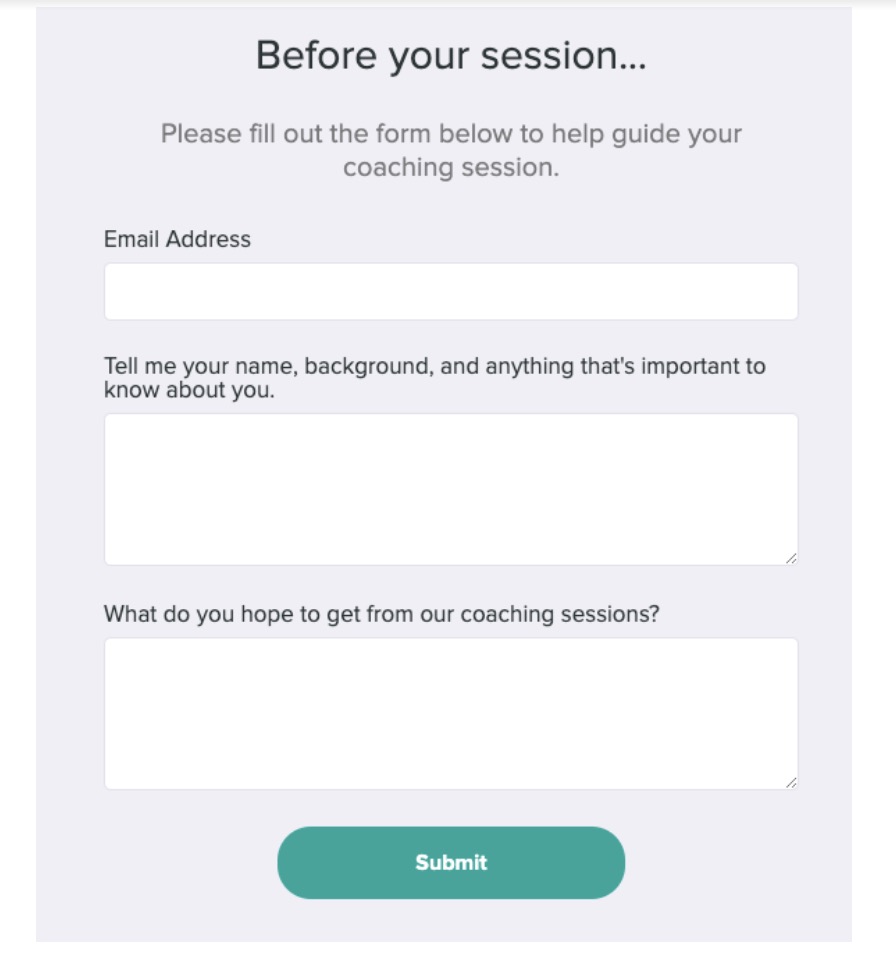If you’re passionate about improving lives, relationships, and careers, you might be curious about how to become a life coach.
As a life coach, you can help people and build a profitable and rewarding business. And according to recent reports on how much money life coaches make, the average hourly rate is $231. If you met with five clients for an hour each, you’d earn $1,155. And more experienced coaches can also attract clients at higher hourly rates of $300 to $400 or more.
The life coaching industry is expanding rapidly. The International Coaching Federation (ICF) reported that there were approximately 71,000 coach practitioners globally in 2019, and that number continues to grow.
Many different types of coaches use Teachable—from business to dating and life coaching.
We’ll dive into everything you need to know to become a life coach and show you nine critical steps to start your own coaching business.
{{audience-component="/blog-shortcodes/blog-popup"}}
What is a life coach?
Simply put, a life coach is a professional who helps individuals with personal growth and development. And life coaches partner closely with clients to help them navigate all aspects of their lives. So this can include supporting relationships, career development, health and wellness, finances, and life planning.
Life coaches are not only great listeners and compassionate humans. But they’re also experts in motivation and goal setting. A life coach helps their clients get from where they are to where they want to be.
What does a life coach do?
This varies but typically, life coaches offer one-on-one or group coaching sessions. And during those sessions, they work to support people in overcoming personal and professional challenges. Their job is to help clients identify their goals in life and teach tangible skills to work towards those goals.
Life coaches use a range of tools and strategies to help clients reach their potential. So depending on their niche, a life coach can specialize in several different areas.
The primary purpose of a life coach is to:
- Act as an accountability partner to help clients reach goals
- Uncover and overcome limiting beliefs holding clients back
- Create tangible action plans to work toward goals
- Encourage positive daily habits and practices
- Create mindset shifts
- Work through roadblocks and any resistance to change
- Increase confidence and self-esteem
- And help clients find clarity and a greater purpose in life
Life coaching skills needed
Although life coaches are not required to have specific training, successful life coaches have a broad array of personal and professional skills. These can include:
- Communication skills – Asking the right questions, practicing active listening, and reading body language, so you’ll better understand clients and earn their trust.
- Organizational skills – You’ll need to create roadmaps and action plans for your clients, and keep your business organized.
- Business skills – Becoming a life coach is a business decision. You’ll manage everything from bookkeeping to marketing to administrative tasks. You’ll also need strong leadership and delegation skills if you hire a team.
- Emotional awareness – As a life coach, you’ll need to be aware of your client’s thoughts and emotions as well as your own. Empathy and emotional intelligence help you stay neutral and judgment-free during coaching sessions.
Do you need a life coach certification?
The short answer is no—you don’t need a professional certification or educational background to become a life coach. And anyone can have a successful life coaching career with the right skills and expertise.
Although coaching is an unregulated industry, becoming a professional certified coach can help build credibility with clients. In the 2022 Global Consumer Awareness Study, 85% of coaching clients said it’s important that their coach holds a certification or credentials.
If you do a life coaching certification program, make sure it has credentials from a reputable association like the International Coach Federation (ICF). And the ICF has a free directory for coaching education programs, which vary widely in cost and length to complete.
Here are a few life coach training programs to consider.
- Institute for Professional Excellence in Coaching – A comprehensive program that comes with three accreditations. Cost: $14,000

- Coach U Core – A self-paced online training program that typically takes six months to complete. Cost: $6,095
- Certified Life Coach Institute Certification – This three-day intensive program teaches the core competencies of coaching. Cost: $995
Life coach vs. therapist
Both life coaches and therapists help people with overall well-being and personal growth. However, there are differences between the two, mainly in their areas of focus.
Therapists support mental health and often focus on healing from past trauma or challenges. Life coaches, on the other hand, are future-oriented with a focus on goal setting and motivation.
Unlike life coaches, therapists are mental health professionals with strict training requirements. And therapists also have regulations around how they treat and diagnose mental health conditions.
So here are the main differences between a life coach and a therapist:
How to become a life coach
Ready to get your life coaching business off the ground? Below are nine steps to help you start your professional coaching practice.
1. Find your coaching niche
Coaching is a broad and competitive field. Finding your coaching niche will help you market your services and attract the right clients.
Examples of life coach specialties include:
- Business and career development
- Dating and romantic relationships
- Health and wellness
- Spirituality
- Finance
To find your niche, start by focusing on your skillset and background. Play to your strengths. Then, focus on defining your ideal clients and their needs.
Perhaps you have a past profession as a clinical dietician or nutritionist. Your niche may be busy families that want to make healthy eating choices. For example, Teachable creators Susan Watson and Andrea Hardy offer online training for efficient, healthy meal prep advice.

Once you’ve found your niche and ideal clients, use this to inform your messaging and marketing strategy.
2. Decide if coaching certification is right for you
You don’t need life coach certifications or a degree to start working with coaching clients. For example, let’s say you’ve built one or more businesses with million-dollar annual revenues. Since you have first-hand experience as an entrepreneur, you already have the skills you need to help aspiring business owners.
However, if you want to work with companies as a life coach, they may request an accreditation. Again, professional certification can only help build your credibility.
Remember, you don’t need a college degree to be a life coach. If you already have a relevant degree, like psychology, you can use it to boost credibility. Otherwise, lean on your experience or pursue certification, which costs much less.
3. Determine how you’ll work with clients
As you hone in on your coaching niche, you’ll want to decide how to work with your clients. You’ll likely want to offer different services and package options to fit the needs of your ideal clients.
Options for how to deliver your coaching services include:
- One-on-one coaching – When you work one-on-one with a client, you can develop deeper relationships and create more custom, individual solutions. Depending on your coaching niche, this may be the best fit for your services.
- Group coaching – You might host group coaching sessions when working with companies or families. Group coaching can also include courses and cohort-based learning opportunities.
- Online coaching – Many people enjoy the flexibility of remote coaching, which typically has fewer start-up costs and doesn’t limit your geographic reach.
- In-person coaching – If you coach in person, be sure to include office costs and management in your business plan.
There are pros and cons to each coaching format in terms of scalability and pricing.
4. Calculate startup costs
A major advantage of starting a coaching business is the low startup costs, especially for online coaching. Calculating specific costs for your business will depend on your certification needs and coaching format.
The cost to become a certified life coach depends on which program you choose. Programs can cost between $1,000 – $14,000.
If you coach in person, you’ll need to budget for office space, and all that comes with it—furnishing your space, rent, and utilities.
Alternatively, virtual coaching has fewer startup costs. Most will be around software and tech to set up and manage your business, including:
- Website costs
- Coaching platform
- Bookkeeping software
- Any other tools (project management, scheduling)
You’ll also want to consider any marketing costs if you hire a marketer or plan to run ads.
5. Figure out pricing
You may become a life coach to change lives, but it’s also a business endeavor. And in order to grow your coaching business and revenue, you need to accurately price your services.
Pricing for life coaches depends on experience and how you work with clients. Generally, the level of effort and price will be higher for one-on-one services than group coaching services.
To figure out your pricing, start by considering each of your services. How much time, energy, and cost will you dedicate to them? From there, you can set an hourly rate that reflects your experience level and the value you bring to your clients.
Researching other life coaches in a similar niche can be a helpful starting point in setting your prices.
6. Register your life coaching business
Before you accept coaching clients, you’ll need to determine your business entity. Then, you’ll register your life coaching business with your state. Registering your business helps to limit your liability and can also offer tax benefits.
Registering as a Limited Liability Company, or LLC, is a popular option for life coaches. And registration fees are specific to each state and typically cost around $300.
7. Build a website or use a coaching platform
A well-designed website or coaching platform is one of your greatest assets as a life coach. Because a website is the first place potential customers go to learn more about you and your services.
It builds your coaching credibility and creates a seamless way for clients to interact with you.
Here are a few quick tips to help you build your coaching website:
- Create compelling copy that speaks to your ideal client
- Describe yourself, your experience, and your coaching packages
- Make it easy for clients to book with you or learn more
- Use a coaching platform like Teachable
An online coaching platform is a great addition or substitute for a traditional website. And Teachable for coaches allows you to create sales pages, communicate with clients, accept payments, and integrate coaching with courses. You can also design intake forms to learn more about your potential client and prepare for their first coaching session.

8. Create a marketing plan
A marketing plan can help you attract potential clients and grow your life coaching business. So tailor your marketing plan to your target audience and include a content strategy with specific, measurable goals.
These steps will help you create an effective marketing plan for your life coaching business:
- Define the needs and pain points of your ideal clients.
- Research other life coaches in your market, and identify your unique value proposition (UVP). Your UVP is what differentiates you from other life coaches in your market. It could be your niche, experience, coaching style, or service.
- Set marketing goals that are specific, measurable, and achievable. Examples include signing a number of clients within six months, growing your social media presence, or generating more referrals.
- Develop a content strategy that aligns with your coaching niche and unique value proposition. Create engaging and valuable content such as blog posts, videos, or social media content.
- Determine which marketing channels align with your ideal clients and goals. Health and wellness coaches may find success marketing on social media channels like Instagram and TikTok, while coaches that specialize in career advice may connect with potential clients better on LinkedIn and email.
- Track your results and adjust your marketing plan over time to ensure that your efforts are effective.
9. Gather testimonials
Testimonials can attract new clients to your coaching business. And positive client reviews are valuable as social proof—they establish credibility in your abilities as a coach and build trust with potential clients. This can be especially powerful for coaches who are starting out or working in competitive niches.
Add testimonials to your website and leverage them in your marketing efforts as a cost-effective way to reach new potential clients.
And you can establish a referral program for clients who have had a positive experience working with you. Referrals are one of the best ways to get coaching clients and grow your business.
Start your life coaching business
So we know that becoming a life coach takes time, energy, and passion. But by implementing these step-by-step strategies, you’ll be on your way to growing a successful life coaching business. Getting started is easy too. You can begin with a free account with Teachable, set up your sales page, and offer a coaching package.
Join more than 150,000 creators who use Teachable to make a real impact and earn a real income.


